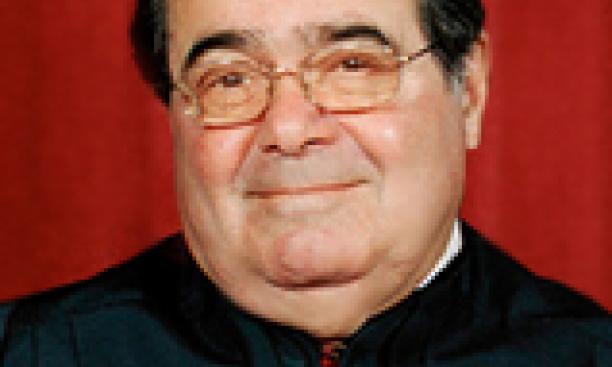

Justice Antonin Scalia (Photo: Steve Petteway, Staff Photographer of the Supreme Court)
More than 800 students, faculty, and community members gathered in Richardson Auditorium Dec. 10 to hear Antonin Scalia, the longest-serving justice of the current Supreme Court of the United States, speak about the Constitution. They did not anticipate, however, that an exchange between Scalia and an undergraduate would attract more attention than Scalia’s lecture.
In a carefully prepared question, Duncan Hosie ’16 asked Scalia about his past comparison of gay sex to murder and bestiality in his legal opinions.
“I find this extraordinarily offense, partly because I’m gay. … Do you think it’s necessary to draw these comparisons, to use this specific language to make the point that the Constitution does not protect gay marriage?” Hosie asked.
This question, and Scalia’s answer, have made national headlines just days after the Supreme Court decided to review two cases relating to gay marriage in the first half of 2013.
“I don’t think it’s necessary, but I think it’s effective,” Scalia said. “It’s a form of argument that I thought you would have known, which is called ‘reduction to the absurd,’” eliciting appreciative laughs and applause from the audience, greater applause than Hosie’s own question drew.
“If we cannot have moral feelings against homosexuality, can we have it against murder? Can we have it against other things?” Scalia continued. “I don’t apologize for the things I raise. … I’m surprised you aren’t persuaded.”
As the speaker for the James Madison Program’s annual Herbert W. Vaughan Lecture on America’s Founding Principles, Scalia presented the themes of his recent book, Reading Law, chief of which is the importance of an originalist interpretation of the law.
“Some people like the ‘living Constitution’ because they have the notion there's no harm done because it will always lead to greater freedom,” he said. “I don’t know why you would think that’s a good thing unless you’re an anarchist.”
In his view, believing in a “living Constitution” introduces greater rigidity to the law. “My Constitution is a very flexible one: There’s nothing in it about abortion, and since there isn’t, it’s up to the citizens,” he said.
For originalists, Scalia said, “The Constitution was a rock to which society was anchored, and the notion that it changed from age to age was ridiculous.”
He emphasized the nonpartisan nature of originalism, offering examples in which originalist decisions would disappoint different ends of the political spectrum.
With originalism, he said, tongue-in-cheek, “You can control Scalia. If you show Scalia, ‘This is what the Constitution originally meant,’ you got him, he's handcuffed — he can’t do the nasty conservative things he would like to do to the country.”

Sarah Xiyi Chen ’13 is a Woodrow Wilson School major from Arcadia, Calif.
